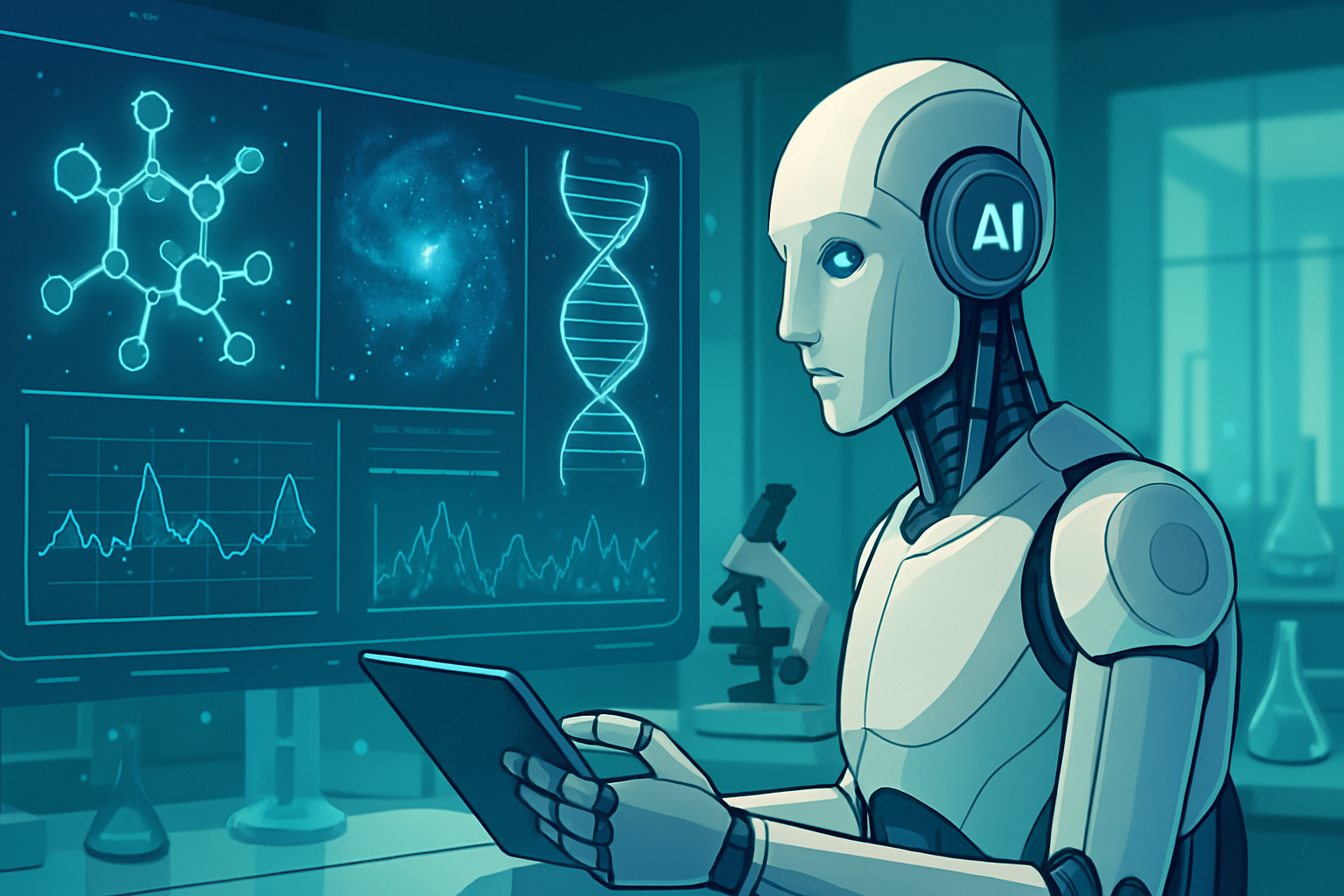Article 16: AI in Scientific Research: Accelerating Discovery and Innovation
Meta Title: AI in Scientific Research (2025): Accelerating Discovery & Innovation
Meta Description: Explore how AI is revolutionizing scientific research, from hypothesis generation and data analysis to experiment automation and accelerating discoveries in various fields.
Target Keywords: AI in science, AI research tools, AI for scientific discovery, machine learning in research, AI experiment automation
The AI Catalyst: Accelerating Scientific Discovery and Innovation in 2025
Scientific research has always been about pushing the boundaries of human knowledge. In 2025, Artificial Intelligence (AI) is emerging as a powerful catalyst, dramatically accelerating the pace of discovery and innovation across virtually every scientific discipline. From formulating new hypotheses and analyzing colossal datasets to automating complex experiments and uncovering hidden patterns, AI is equipping scientists with unprecedented tools to tackle some of the world’s most challenging problems.

How AI is Transforming the Scientific Method
- Hypothesis Generation & Literature Review:
- Functionality: AI algorithms can sift through millions of research papers, patents, and datasets to identify unexplored connections, suggest novel hypotheses, and provide comprehensive literature reviews in a fraction of the time it would take a human researcher.
- Impact: Helps scientists stay abreast of the latest findings, identify promising research avenues, and avoid redundant efforts.
- Big Data Analysis & Pattern Recognition:
- Functionality: Modern science generates an overwhelming amount of data (e.g., from genomics, particle accelerators, climate modeling, telescopes). AI, particularly machine learning, excels at analyzing these massive and complex datasets to identify subtle patterns, correlations, and anomalies that would be impossible for humans to discern.
- Impact: Leads to new insights and discoveries in fields like genomics, astrophysics, materials science, and environmental science.
- Experiment Design & Automation:
- Functionality: AI can assist in designing more efficient experiments and can control robotic systems to automate repetitive laboratory tasks, such as sample preparation, data collection, and high-throughput screening.
- Impact: Increases the speed and reproducibility of experiments, reduces human error, and allows researchers to conduct more experiments than previously possible.
- Simulation & Modeling:
- Functionality: AI can create highly complex simulations and predictive models of natural phenomena, from molecular interactions and climate change scenarios to galaxy formation and disease progression.
- Impact: Allows scientists to test hypotheses in virtual environments, explore scenarios that are difficult or impossible to study directly, and make more accurate predictions.
- Drug Discovery & Materials Science:
- Functionality: As discussed previously, AI is revolutionizing the search for new drugs. Similarly, in materials science, AI can predict the properties of novel materials and guide the synthesis of materials with desired characteristics (e.g., for batteries, catalysts, or superconductors).
- Impact: Accelerates the development of new medicines and advanced materials with significant societal benefits.
- Image Analysis in Various Fields:
- Functionality: From analyzing astronomical images to identify new celestial objects, to interpreting microscope images in biology, or satellite imagery for environmental monitoring, AI-powered image recognition is a versatile tool.
- Impact: Automates and enhances the analysis of visual data across many scientific domains.
Benefits of AI in Scientific Research
- Accelerated Pace of Discovery: AI significantly speeds up various stages of the research lifecycle.
- Handling Complexity & Big Data: Enables analysis of datasets that are too large or complex for traditional methods.
- New Insights & Unforeseen Discoveries: AI can uncover patterns and connections that humans might overlook.
- Increased Efficiency & Reduced Costs: Automation of tasks and more efficient experiment design can save time and resources.
- Democratization of Research: AI tools can make sophisticated analytical capabilities more accessible to a wider range of researchers.
Challenges and Considerations
- Data Quality & Availability: AI models are only as good as the data they are trained on. Ensuring high-quality, well-curated datasets is crucial.
- Explainability & Interpretability (Black Box Problem): Understanding how an AI model arrives at a particular conclusion can be challenging, which is a concern when validating scientific findings.
- Reproducibility: Ensuring that AI-driven research is reproducible requires transparency in models, data, and code.
- Algorithmic Bias: Biases in data or algorithms can lead to skewed or incorrect scientific conclusions.
- Need for New Skills: Researchers need to develop skills in data science and AI to effectively leverage these tools.
- Ethical Implications: As AI becomes more powerful in research (e.g., in genetics or autonomous experimentation), careful consideration of ethical implications is necessary.
The Future of Scientific Inquiry
AI is set to become an even more indispensable partner in scientific research. We can envision AI systems that can autonomously design and execute experiments, collaborate with human scientists on complex problems, and even propose entirely new scientific theories. The synergy between human intellect and artificial intelligence holds the key to unlocking new frontiers of knowledge and addressing some of humanity’s most pressing challenges, from climate change and disease to understanding the fundamental nature of the universe.
Leave a Reply